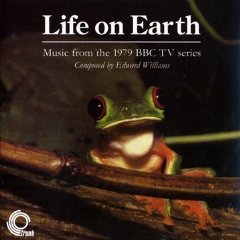Trunk Records is a curious label, specialising in cultural detritus and various obscure flavours of thirty- and forty-something nostalgia. Inevitably, their output can sometimes seem a touch over-whimsical, but at its best can open up those long, poignant perspectives that make the past feel like strange magic (Fuzzy Felt Folk, their compilation of 1970s children’s songs, is haunting indeed for those of a certain age). Probably Trunk’s most worthwhile contribution has been the rediscovery of some truly startling music, often composed for the most mundane purposes, which now seems improbably, pointlessly good. It’s only fair that the obsessively forward-looking work of Basil Kirchin or Tristram Cary should get its crack at the 21st century, and the incidental music from Life On Earth, 30 years on from its first broadcast, turns out to be more lost gold. The origin of this release is typically serendipitous: a friend of Jonny Trunk found a vinyl copy of the soundtrack, privately pressed in 1979 for the hundred or so musicians involved, lying around in a second hand shop (and I for one am envious; the junk shops near me refuse to take owt but the 12" of ‘The Final Countdown’). Months of negotiation with a bemused BBC paid off, and this is the result – Mr Trunk’s most prestigious release, and almost certainly his best.
Hard to credit now, but there was once something paternalistic, almost philanthropic about the Beeb, spreading the cultural wealth of the educated classes through housing estates and comprehensive schools. This kind of evangelism rarely sits well with self-conscious champions of the lumpenproletariat, whose right to live in shit, they believe, outweighs their right to not live in shit – for some, being patronised is worse than being brutalised. But then people can be very naïve about the motivations of those who give the people what they want, relentlessly and remorselessly. And while the Corporation was sometimes guilty of gross assumptions and a very real stuffiness, I don’t like to think how I might have grown up – stomping around in the middle of nowhere – had it not been for Life On Earth, or Carl Sagan’s Cosmos, or James Burke’s Connections, or the gentle guidance of the BBC Childrens’ department. Years ago, I interviewed the men in charge of "youth programming" at Channel 4, goateed and bereted and utterly insistent that their race to the bottom was a noble crusade; they railed against the BBC’s "eat-your-greens" approach, and spoke of gallons of liquid effluent, coursing through the pipes of British culture, in terms of freedom and some strange colour of egalitarianism. Here was the future, banging its drums, and even then it made me blanch. As controller of BBC2 in the late 1960s, David Attenborough had a different vision, rooted in what was, for all his personal privilege, an (enduring) belief in inclusivity. If the so-called Golden Age of Television could boast its fair share of shoddy, overlit crap – and my God, it could – at best it was truly empowering, and its passing has screwed us all to some extent. We can still choose to watch BBC Four, I suppose (assuming it’s not another show where ex-NME writers smirk at Mud’s trousers), but then this is an age of choices, few of which have much to do with freedom in the long term. No one’s going to stumble onto culture any more, not like I did, or my dragged-up mates did. It’s worse than a shame.
So, in 1979 this strange modern classical music, the work of composer Edward Williams, thrilled millions for thirteen weeks (which possibly couldn’t be said for Williams’ 70s synth-prog outfit, Uncle Jambo’s Pendular Vibrations). It took hippos and ferns and frogs and bugs and great big roaring lions to make the buggers listen, but we listened, or at least had the chance to listen. In 2009 – out of context and out of time – it seems outrageous that this stuff ever got near the mainstream, even smuggled in beneath the belly of a mountain gorilla. Rather than bombastic, as documentary music tends to be these days, these sounds are curiously intimate; the music feels almost humble, conscious of being, itself, a product of the evolutionary process. Many composers, charged with soundtracking what was then the most eye-popping nature footage ever, would have been tempted to bang their chest. Williams’ work is more of a whisper: orchestral instruments gathered in small groups, sometimes fed Eno-like through primitive synths (specifically the good old VCS3), creating moods as rare and oddly-coloured, as febrile or freezing as the biosphere. If at times its motifs are predictable – Japanese macaques are serenaded with an approximation of shamisen / koto / hotchiku music, and elephants walk to the fat sound of brass – at times it’s truly sublime, as in ‘Eusthenopteron And the Primeval Swamp’, an electronic mood piece which barely exists. On the last track, ‘Man’, Sir David’s voice drifts in and out, twitchy over the future of his species, while Williams sets up a gut-grinding face-off between sweet, keening strings and a low atomic rumble.
This is not necessarily the finest work of its type – somewhere, someone may well be chuckling at we dilettantes getting off on a TV soundtrack, spoonfed and gauche, like hippies entranced by the sitar player tuning up. Well, whatever. It’s still an extraordinary record, and its provenance just makes it all the more remarkable. Perhaps the very best thing here, astonishing in its scope and brevity, is the title music’s 40-second sketch of the dawn of life: a distorted shudder of brass from somewhere deep in the cooling Earth, then an unsteady fanfare emerges, wobbling discordantly like baby steps. And I could swear that bewildering wrong/right note, twenty-seven seconds in, happens to be – after the Doctor Who theme – the first time my tiny self was alerted to stranger and wilder places sound could go; places to which I’d just been granted access.


